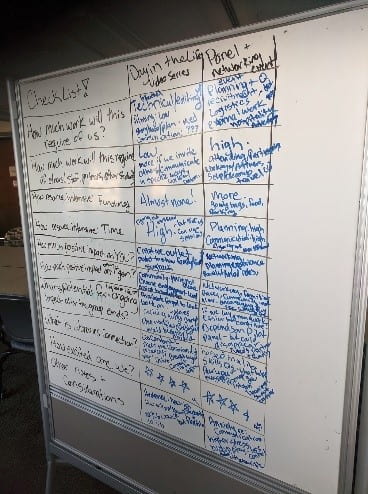September 16, 2020
I Wish My Parents Knew: A New Message For Parents From First Gen Students
Meeting user needs on the basis of equity and inclusion is embedded in the UW Libraries Mission, Vision and Values. A central part of Libraries outreach and education efforts focus on collaboration with UW First Year Programs, including parent orientation to over 500 parents, many of which include those of first generation college students. In these orientation sessions, Libraries share information about services and resources, as well as helpful tips for new students and parents.
Thanks to the ingenuity of an enterprising group of first generation college students, this year’s summer parent orientation program was inspired by a new video for parents by students. It’s part of the Libraries’ ongoing effort to utilize participatory design to inform and improve programs and services. In the fall, the Undergraduate Student Success team is offering a virtual orientation specifically for first generation students during Dawg Daze, and it wouldn’t have been possible without these six phenomenal students.
Twice-weekly sessions combined participatory design principles with activities and open discussions to accurately understand the first-generation college experience and work together to co-create a resource addressing those needs.
In a post-project interview, students reflected on their experience working together with other students and what the project meant to them…
“It was really cool to be part of a project that I put some of myself into, my own experience. It meant a lot to know that I could have an influence to help others, and helpful to see that there are people who have the same confusion, uncertainty and that others are struggling along with you.”
“My grades are not my whole story. My performance academically is not my whole story, and that’s been true for most of my life – although I haven’t been able to tell that to many people. It was really refreshing and different to see someone actively looking for first generation viewpoints.”
“For me, it was super valuable to have that community. Building those relationships, and understanding that we’re not all alone in our struggles and understand there’s a ton of other students that are going through this too, and there are resources we can fall back on.”

(Pre-COVID) Students in Research Commons Red C preparing to record the voiceover for the video. They had borrowed audio recording equipment from the Student Technology Loan Program and were assigning parts of the script.
Through a series of reflection and ideation activities, the students felt a shared need for parents to have more information and context about what it’s like to be a first-generation UW student. With Libraries already leading many parent orientation presentations, it was a natural fit to use this project as a platform for telling their story and experience.
In addition to producing the video, activities included storyboarding, interactive planning and visual artifact creations that all contributed to themes expressed in the video.

The “Checklist” activity helped the team evaluate top ideas and make a decision about which one they wanted to move forward with.
Students also shared feedback on how this project helped them to understand the Libraries better and what is important for new students to know:
“Being a freshman, I didn’t even realize there were more than three libraries on campus. It was so helpful – both being able to make a difference and just have the knowledge of the resources I had on hand to use.”
“The Libraries are so complex, that sometimes it feels overwhelming. Actually hearing all of the resources laid out was super beneficial to me.”
“UW librarians are awesome. Give yourself a chance to connect – they are more than willing to help with any problem you have.”
“Librarians are there to help us succeed and that there is no need to be scared of them.”
Maggie Faber, Libraries Assessment & Data Visualization Librarian and Emilie Vrbancic, Undergraduate Experience Librarian, collaborated and co-led the project.
“The Libraries began this work to explore new, more meaningful ways of involving students in the process of data collection and decision-making to improve Libraries services, and to more substantially center equity in our work,” says Faber. “It was so rewarding to co-create that improvement with students; it will shape the way we connect and engage with students moving forward.”
“It was so rewarding to co-create that improvement with students; it will shape the way we connect and engage with students moving forward.”
“The most impactful part of this project was the relationships we made with students and the small but mighty community they made with each other,” said Vrbancic. “This was evident when we had to switch to fully online facilitation— we didn’t miss a beat, and the students showed up for one another in thoughtful and caring ways. Over the 10 weeks, we had time to really listen. Students shared such personal parts of themselves, reflecting on all of the challenges and triumphs that come with being a first-generation UW student. This will have a lasting impact on my work at the UW Libraries.”
“This project will have a lasting impact on my work at the UW Libraries.”
While COVID-19 has certainly impacted the way orientation will be held, and how students will interact this fall, nearly all of the services and support programs featured in the video are still providing services for students remotely, including the Libraries! Students can sign up for a personal consultation, or ask for help 24/7 through our online chat service. Just ASK US!
This project was funded in part by the Odegaard Parents Fund and the Kenneth S. and Faye G. Allen Library Endowment Fund. A secondary participatory design project is currently underway with a focus on online students and online only learning.
Questions?
If you would like to learn more about our participatory design activities and methodology, contact Maggie Faber, Assessment & Data Visualization Librarian.

